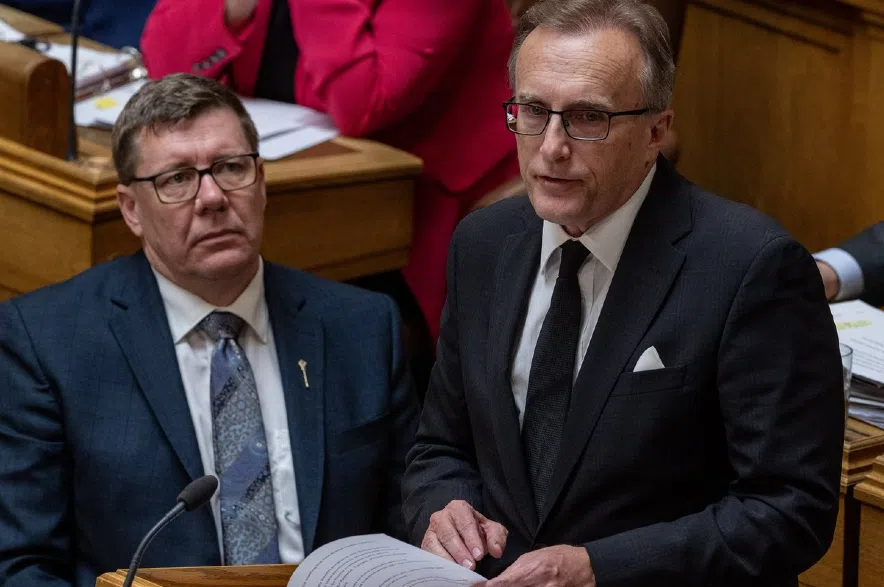SASKATOON — Saskatchewan’s financial fortunes this year have taken a dramatic hit.
The province had budgeted a $12-million surplus this fiscal year, but a first-quarter update issued Friday announced that the modest surplus is now on track to be a $349-million deficit.
Read more:
- Premier will visit China and Japan for trade mission in September
- Saskatchewan Premier Moe, federal minister to meet on China canola tariff
- Farmers call govt to take action against Chinese canola tariffs
Saskatchewan Finance Minister Jim Reiter told reporters in Saskatoon on Friday the province is being rocked by global uncertainty, but its overall financial position remains stable.
“Certainly, we would much rather have a surplus,” he said.
Reiter said the deficit is not huge percentage wise when looking at the $21 billion budget, but said it is still significant.
“Our fundamentals are still strong, we’ve got the best credit rating in the country (and) we got the second best net debt-to-GDP in the country,” he said.
“We have the lowest unemployment rate in the country, (and) I think our fiscal house is very much in order.”
The US has expanded its steel and aluminum tariffs to manufactured products that include Canadian steel and aluminum.
This is a major blow to Saskatchewan ag equipment makers who employ thousands of people in our province.
Our Minister of Trade Warren Kaeding has written to the… pic.twitter.com/sPUJEih81y
— Scott Moe (@PremierScottMoe) August 22, 2025
Canola tariffs causing concern
Reiter said U.S. tariffs haven’t impacted the first quarter of the budget much but said he’s concerned about current impacts in areas such as China’s canola tariffs.
Reiter said the province is working on advocating with the federal government and other trading partners to be in a strong economic position.
The province is trying the reversal to a $172-million drop in revenues, most of it from Crown agency SaskPower.
That decline is primarily due to Saskatchewan’s decision to remove the federal carbon levy ratepayers had paid on their electricity bills in a dispute between Premier Scott Moe’s government and the federal Liberal government.
Earlier this year, Moe announced the province paused the industrial carbon levy it had collected from SaskPower and heavy emitters. Ratepayers paid for SaskPower’s portion of the charge on their electricity bills.
The money went to the province’s output-based performance program, which used the dollars on technology projects to lower emissions. Some of that money was also earmarked to stabilize electricity rates.
Asked if Saskatchewan will continue to no longer collect the federal industrial carbon levy, Reiter said he’ll continue to push Ottawa to remove the charge.
“This is an affordability measure,” he said. “We’re not charging the carbon tax to the citizens of Saskatchewan who are having affordability issues.”
Prime Minister Mark Carney had removed consumer carbon levies earlier this year, but Ottawa still applies carbon charges to industrial emitters.
‘We’ve got to be flexible’
Reiter said it’s too early to project how Chinese tariffs on Canadian canola seed, oil and meal, along with broad U.S. duties, will affect the province’s finances.
“We’ve got to be flexible. We’ve got to see how it turns out,” he said. “I’d say we’re concerned because there’s the impact in a lot of areas.”
The first-quarter update says total revenue for the year is now forecast to be $20.9 billion and expenses are predicted to be $21.2 billion.
Non-renewable resources revenue is also projected to decline by $30 million compared with the budget because of lower oil prices and a higher exchange rate. The province is also spending an extra $80 million to fight wildfires this summer.
Saskatchewan’s net debt-to-GDP remains healthy while job growth is on track, the report says.
“We’re going to keep an eye on the coffers, but we’re also going to respond when the people of Saskatchewan need it,” Reiter said. “They need it for wildfires and we’re going to continue properly funding health care, education, social services, highways.”
Unreal. But this is what we’ve come to expect from these guys.
The tired and out-of-touch Sask. Party continues to mismanage the province’s finances, now projecting today a massive $349 million deficit.
We said from day one that this budget wasn’t worth the paper it’s written… pic.twitter.com/9lLHb90iFP
— Carla Beck (@CarlaBeckSK) August 22, 2025
NDP says budget was dishonest
NDP finance critic Trent Wotherspoon slammed the Sask Party over the deficit – especially since it touted a surplus when the budget was unveiled.
“We have a government that is unwilling at budget time to even be honest with Saskatchewan,” Wotherspoon said at a Friday news conference.
“We’ve learned through years with the Sask Party that we can’t trust them with the finances. We know that they can’t manage those finances, but we’ve learned as well that we can’t even take them at their word.”
Wotherspoon further criticized the province’s use of contract nurses, the new Saskatchewan Marshals Service, and the Saskatchewan Revenue Agency.
“The bill is being footed by Saskatchewan people who continue to be asked to pay more and more and more by this government, despite receiving less,” he said.
The NDP noted the province is still forecasting to collect $35 million more in industrial carbon levies this year through the output-based performance program, for a total of $467 million.
The finance ministry didn’t immediately respond to a request for comment about the additional dollars in the program.
Reiter accused the NDP of contradicting itself: they’ve accused the province of cuts, but also say Moe needs to rein in spending.
“It’s kind of laughable, to be honest with you,” he said.
— with files from Mia Holowaychuk, 650 CKOM and Daniel Reech, 980 CJME
Read more:











